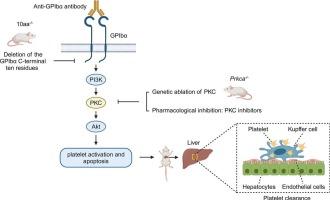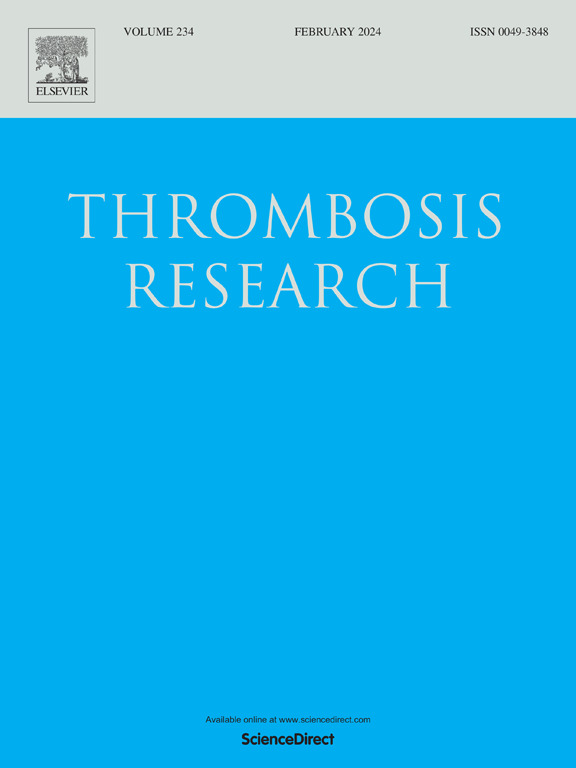The role of protein kinase C and the glycoprotein Ibα cytoplasmic tail in anti-glycoprotein Ibα antibody-induced platelet apoptosis and thrombocytopenia
IF 3.7
3区 医学
Q1 HEMATOLOGY
引用次数: 0
Abstract
Introduction
Immune thrombocytopenia (ITP) is an autoimmune disease characterized by low platelet counts. ITP patients with anti-platelet glycoprotein (GP) Ibα (a subunit of GPIb-IX-V complex) autoantibodies, which induce Fc-independent signaling and platelet clearance, are refractory to conventional treatment. Protein kinase C (PKC) is activated by the binding of the ligand von Willebrand factor (VWF) to GPIbα and regulates VWF-GPIbα-induced platelet activation. However, the role of PKC in anti-GPIbα antibody-induced thrombocytopenia remains unknown.
Materials and methods
The anti-GPIbα antibody-induced PKC activation and its underlying mechanisms were first detected by Western blot, and then the effects of PKC inhibitors, PKC knockout, or GPIbα C-terminal removal on anti-GPIbα antibody-induced platelet apoptosis, activation, aggregation, and clearance were investigated by flow cytometry, platelet aggregometry, and platelet posttransfusion, respectively. Meanwhile, platelet retention and co-localization with macrophages in the liver were detected by spinning disc intravital confocal microscopy.
Results
Anti-GPIbα antibody-induced PKC activation depends on GPIbα clustering and phosphoinositide 3-kinase (PI3K) activation and results in Akt phosphorylation. Pharmacologic inhibition or genetic ablation of PKC suppresses anti-GPIbα antibody-induced platelet apoptosis and activation. Moreover, the GPIbα cytoplasmic tail is required for antibody-induced PKC activation, platelet apoptosis, and activation. Inhibition or ablation of PKC and deletion of the GPIbα cytoplasmic tail protect platelets from clearance in vivo.
Conclusions
Our study indicates the important role of PKC and the GPIbα cytoplasmic tail in anti-GPIbα antibody-mediated platelet signaling and clearance and suggests a novel therapeutic target for ITP and other thrombocytopenic diseases.

蛋白激酶 C 和糖蛋白 Ibα 细胞质尾在抗糖蛋白 Ibα 抗体诱导的血小板凋亡和血小板减少中的作用。
简介免疫性血小板减少症(ITP)是一种以血小板计数低为特征的自身免疫性疾病。ITP患者体内存在抗血小板糖蛋白(GP)Ibα(GPIb-IX-V复合物的一个亚基)自身抗体,这种抗体可诱导Fc依赖性信号传导和血小板清除,但对常规治疗无效。蛋白激酶C(PKC)通过配体von Willebrand因子(VWF)与GPIbα的结合被激活,并调节VWF-GPIbα诱导的血小板活化。然而,PKC 在抗 GPIbα 抗体诱导的血小板减少症中的作用仍然未知:首先通过Western印迹检测抗GPIbα抗体诱导的PKC活化及其潜在机制,然后分别通过流式细胞术、血小板聚集测定和血小板输注后检测PKC抑制剂、PKC基因敲除或GPIbα C端去除对抗GPIbα抗体诱导的血小板凋亡、活化、聚集和清除的影响。同时,通过旋转盘内共聚焦显微镜检测了血小板在肝脏中的滞留以及与巨噬细胞的共定位:结果:抗GPIbα抗体诱导的PKC活化依赖于GPIbα聚集和磷酸肌醇3-激酶(PI3K)活化,并导致Akt磷酸化。药物抑制或基因消融 PKC 可抑制抗 GPIbα 抗体诱导的血小板凋亡和活化。此外,抗体诱导的 PKC 激活、血小板凋亡和激活都需要 GPIbα 细胞质尾部。PKC的抑制或消融以及GPIbα胞浆尾的缺失可保护血小板在体内免于被清除:我们的研究表明,PKC 和 GPIbα 细胞质尾部在抗 GPIbα 抗体介导的血小板信号转导和清除中起着重要作用,并为治疗 ITP 和其他血小板减少性疾病提供了一个新的治疗靶点。
本文章由计算机程序翻译,如有差异,请以英文原文为准。
求助全文
约1分钟内获得全文
求助全文
来源期刊

Thrombosis research
医学-外周血管病
CiteScore
14.60
自引率
4.00%
发文量
364
审稿时长
31 days
期刊介绍:
Thrombosis Research is an international journal dedicated to the swift dissemination of new information on thrombosis, hemostasis, and vascular biology, aimed at advancing both science and clinical care. The journal publishes peer-reviewed original research, reviews, editorials, opinions, and critiques, covering both basic and clinical studies. Priority is given to research that promises novel approaches in the diagnosis, therapy, prognosis, and prevention of thrombotic and hemorrhagic diseases.
 求助内容:
求助内容: 应助结果提醒方式:
应助结果提醒方式:


